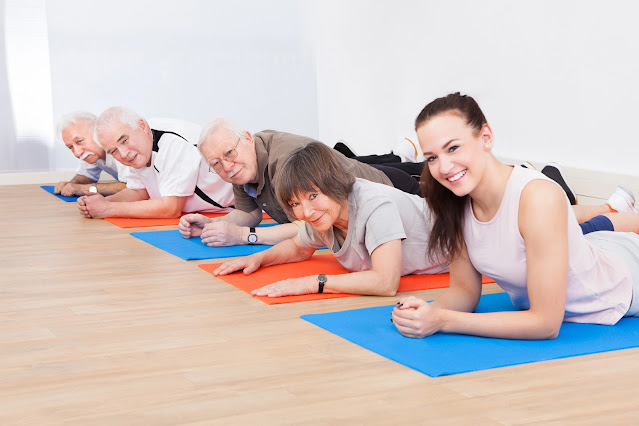Bridging the Gap: Enhancing UK Level 3 Pilates Training to Meet Modern Client Needs
The
Pilates industry in the UK is facing a significant challenge. The basic skills
and knowledge imparted to newly qualified Pilates Matwork instructors at Level
3 often fall short of the expectations and needs of the modern Pilates client. This gap is becoming increasingly apparent as the typical Pilates clientele
grows older, more demanding, and more informed. This article aims to explore this
gap, the reasons behind it, and potential solutions to better equip instructors
to meet the evolving needs of their clients.
The Basics of UK Level 3 Pilates Training
A typical
Level 3 Pilates Matwork qualification in the UK provides instructors with the
fundamentals of Pilates. These courses usually cover around 30 Pilates Matwork exercises,
a basic understanding of Pilates history, and some group exercise training
skills. However, the curriculum is predominantly geared towards teaching fit
and healthy individuals in a group setting. This approach leaves newly
qualified instructors with limited confidence and capability to address the
individual needs of clients, especially those referred by healthcare
professionals for specific conditions or post-rehabilitation.
The Expectations of Modern Pilates Clients
Today’s
Pilates clients often come with a variety of needs that go beyond general
fitness. Many are referred by physiotherapists, general practitioners, or
health charities for conditions such as lower back pain, osteoporosis,
menopausal symptoms, or post-surgical rehabilitation. These clients expect
instructors to have a deeper understanding of anatomy, movement assessment, and
the ability to modify exercises to suit individual health conditions. The
modern client is not just looking for a workout but a tailored approach that
considers their unique physical and health challenges.
The Growing Gap
The
training provided at Level 3 in the UK has remained largely unchanged since
2005, despite significant changes in the Pilates market and clientele
demographics. Even in 2005 the Level 3 qualification was a compromise between
Fitness Pilates, Contemporary Pilates and Classical Pilates Training Academies
but it was a baseline that improved the previous ‘wild west’.
However
in 2024 this outdated curriculum leaves new instructors unprepared for the
complexities of modern client needs. In contrast, advanced training programs
from institutions like Polestar Pilates, Stott/Merrithew, Balanced Body, BASI,
Body Control, APPI Michael King and Alan
Herdman to name a handful offer more complete Pilates education, including
detailed anatomical knowledge and specialised support in how to use ‘Pilates
eyes’ to assess client movement and postural inbalances and how individual
Pilates exercises do more than just meld together to create a fun exercise
class.. However, graduates from these programs represent a small percentage of
the total number of Pilates instructors, highlighting a significant disparity
in training standards within the industry.
In addition even these courses largely remain focussed on the Healthy
and physically fit client and not the ‘real’ customer of today !
Enhancing Instructor Confidence and Competence
To bridge
this gap, it is essential to provide high-quality continuing professional
development (CPD) workshops that focus on the specific needs of modern clients.
Unfortunately, many of the workshops currently offered by major training
schools are centered around Pilates apparatus or fitness accessories rather
than addressing Health conditions and wellness needs.
Mbodies
Training Academy stands
out by focusing on special population CPD for all Pilates instructors and
physiotherapists. Their courses cover essential topics such as:
- Post-rehabilitation after
breast cancer surgery and reconstruction
- Adaptations for clients with
low bone density
- Programming changes for
post-menopausal clients compared to pre-menopausal ones
- Understanding and addressing
female pelvic health conditions
These CPD
courses are designed to be flexible and accessible, allowing instructors to
learn at their own pace with one-on-one tutor support. By opening their doors
to graduates from all Pilates training schools and not just their own, Mbodies
Training Academy fosters an inclusive learning environment that encourages
continuous professional growth.
Conclusion
The gap
between the basic skills of a newly qualified Level 3 Pilates Matwork
instructor and the needs of the modern Pilates client is significant and
growing. To ensure instructors are well-prepared to meet these demands, it is
crucial to integrate more comprehensive and specialised training into the base
qualification and to provide accessible, high-quality CPD opportunities. By
doing so, we can build a more confident and competent workforce of Pilates
instructors capable of delivering the personalised and effective care that
modern clients expect and deserve.
For more information on enhancing your Pilates training and accessing specialized CPD courses, visit https://mbodies.thinkific.com/collections/special-populations-education .
Author: Chris Onslow - Pilates Consultant
Chris Onslow, has run Pilates focussed businesses since 1998. He and his team specialise in supporting Pilates entrepreneurs and business owners. With a rich history of owning and running successful Pilates studios in the UK, and supporting others in Europe and the Middle East, Chris has broad expertise in maximising profitability and optimising operational efficiency. His agency provides top-tier advice on selecting new, pre-owned, and hireable Pilates equipment from renowned brands such as Align-Pilates, Balanced Body or Stott-Pilates/Merrithew. As the founder of Mbodies Training Academy, Chris continues to revolutionise Pilates education, offering premier online and hybrid CPD and qualification courses for Pilates apparatus instruction and special population CPD. Discover more about how Chris can support your Pilates Business or home exercise choices at www.pilates-consultant.co.uk





Comments
Post a Comment